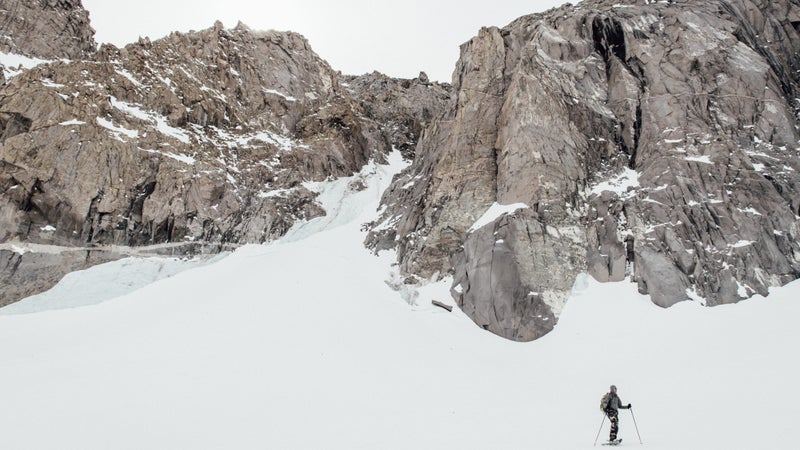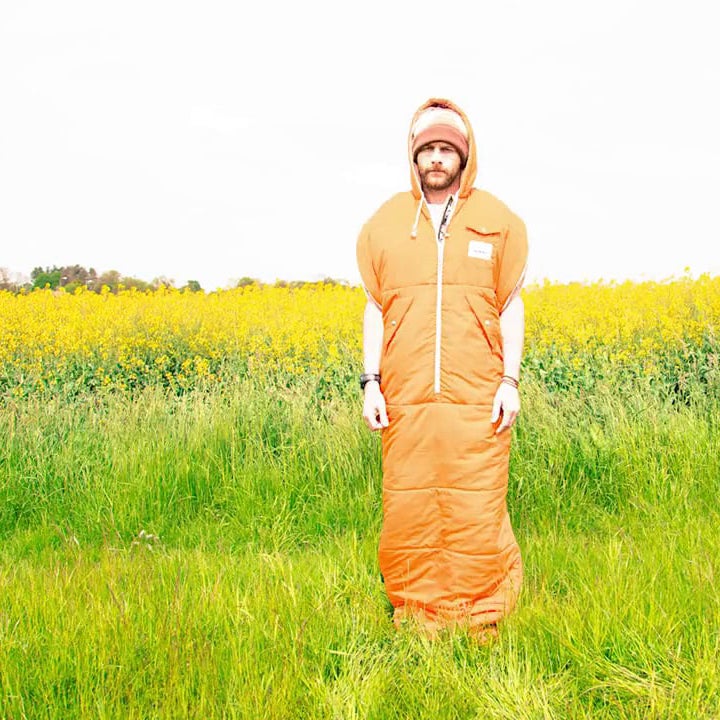We've all done some stupid stuff while camping. Let's learn from our mistakes.
Not bringing warm enough clothes: This is the number one mistake I see. Inevitably, someone has failed to realized that the mountains are colder than the city or that the desert can be, too. Or, they think, “45 degrees? I walked all the way from my car to the front door once when it was that cold, and it was totally fine!”
If you’re going to go outside in an unfamiliar place, or at an unfamiliar time of year, or there’s any chance that the weather could do something unexpected, then you need to be prepared for the worst. And, you also need to understand that spending a considerable amount of time in chilly temperatures feels much colder than just quickly experiencing them. Especially as your metabolism starts to slow at night.
This weekend, I’m going camping in the Sierra Nevada mountains, at about 11,000 feet. It’s almost June, and the weather should be clear, but I’m still packing a hard shell, a high-loft down jacket, warm base layers, thick socks, a wool hat, and insulated gloves.
You can be comfortable outdoors in virtually any weather. You just need to dress for it.
Packing too much stuff: On the flip side, almost everyone brings stuff with them they won’t need. You can address the need to bring adequate equipment for a wide range of conditions by using high-quality gear that performs many roles. Then only bring one set of everything. You need a rain shell for instance, but you may also want a soft shell for colder, drier days. Rather than packing both, you could simply employ a waterproof jacket that breathes as well as possible, and that has pit zips to shed head and water vapor. That’s why I wear the , which is made from the one of the most breathable waterproof/breathable membranes around—Polartec Neoshell—and which has those big underarm zippers.
It takes experience to know what basic gear you need to pack. So pay attention to what you end up using on a trip, and what you don’t, then take notes so you’ll be better informed the next time around. And, as you’re packing, ask yourself, “Do I really need that?” Not, “Might I need that?”
Heavy boots on easy hikes: After too heavy a pack (the product of bringing too much stuff), the second fastest way to slow yourself down is to wear big, heavy boots when you don’t need them.
If you’re hiking on a trail that’s not covered in deep snow and your body is holding together well enough that you don’t risk a sprained ankle every time you tread on a loose surface, then you are better served by the lightest, most well-ventilated trail runner possible—not something made to withstand industrial accidents. Those boots definitely have their place (off-piste in dangerous conditions), but the vast majority of hikers and backpackers stay on-trail.
Look for a shoe with as much traction as possible and opt for one without a waterproof membrane. Low-cut shoes will get wet inside no matter how waterproof they are, but well-ventilated ones will dry out very quickly due to the motion of your feet. Shoes with waterproof membranes, in contrast, stay wet for days. I’m wearing Adidas Outdoors’ new : pair those shoes with two pairs of quality, lightweight merino wool socks. Those will work across a variety of temperatures, insulate while wet, and dry quickly. Wear one, and carry another, exchanging dry for wet as necessary. Add if blisters become a problem or if your feet get cold. I’ve put several hundred miles on two pairs of , and they’re still as good as new.
Failing to layer: Your base layer keeps you dry by wicking sweat. Your midlayers provide insulation. Your shell keeps the weather off. Splitting the three up into different items means you can strip them off or add them as necessary for varying weather conditions and activity levels. Wearing one giant parka might keep you warm in camp at night, but it will stop working the second you try to do anything else.
Not practicing: Get into camp late at night, during a storm? Man, it’s going to suck trying to figure out how to erect your fancy new tent. It’s easier to figure out where everything goes at home, on a nice sunny day. And the same goes for most other items of camping gear. Get a bad night’s sleep on that new sleeping pad? You could easily have figured that out at home, on your living room rug, then returned the pad for a better one if needed.
No, or inadequate, sleeping pads: Everyone knows you need a sleeping bag, but I’m constantly amazed by the number of people who think they can go without a sleeping pad. “We’ll rough it!” they say. Then they don’t get one minute of sleep all night.
Not only do sleeping pads insulate you from the ground, providing essential nighttime warmth, they also cushion and support your body for a good night’s sleep. The latest generation of inflatable pads is just incredible, and some even rival the comfort of the expensive mattress you have at home. Make sure you read , and our breakdown of the latest couple’s camping gear, too. And no, you can’t just bring your yoga mat.

Not preparing to poop: Please don't plan on wiping with leaves. And no one wants to walk through bushes near a camp site only to find little brown wads of toilet paper clinging to their branches. Maximize your comfort and cleanliness while minimizing your impact on the outdoors by packing a trowel, baby wipes, a few ZipLoc bags, and a little bottle of hand sanitizer. Dig a hole six to eight inches deep (that’s where the bacteria that best break down poop live), do your business in it, wipe your butt with the baby wipes, put them in that ZipLoc, compress the air out of it, seal it, and pack it out. Mother Nature, and everyone else who goes outside, will thank you for it.
Not coordinating gear: See “Packing too much stuff.” If your friend is already bringing a stove, then you don’t need to bring another. And you don’t need to buy something if you can borrow it. In big groups, plan all this out in a spreadsheet, and you’ll be amazed at how much money, weight, and effort you can save.
Running out of whiskey: Rookie move. Sitting around a campfire is thirsty work: bring more booze than you think you’ll need.
Sleeping naked: I will state this once an for all: there is no truth to the old saying that you sleep warmer if you don’t wear clothes inside your sleeping bag. More insulation is more insulation, period. Always wear your base layers to bed—they keep your body oils off your down, extending its life and maximizing the feathers’ ability to loft and insulate. If you’re really trying to cut weight, you can even pack a less-insulated bag than you’d otherwise need, and plan on wearing both your base and mid-layers inside of it. That’s a hardcore approach for experienced types if we’re talking about planning, but an easy way for anyone to make it through a night that’s colder than expected.
https://www.youtube.com/embed/X5W6r5U7yBE
Not knowing how to use an axe: Sweet baby Jesus, please stop swinging an axe at your leg when you’re way out in the woods. To be safe, any axe needs to be sharp. That will minimize effort, maximize results, and reduce the chances of the axe glancing off the wood, then lopping through your shin. Next, take a wide stance and swing between your legs, where there’s no chance of a strike, should you miss the log. To be even safer, kneel down. That reduces the arc through which the axe swings, meaning it can only hit the ground if you miss, not your knee.
Bringing bug spray without DEET: DEET is the only chemical that has any proven ability to ward off mosquitos when topically applied. Skin So Soft and other DEET-free remedies are not effective. DEET is one of the most commonly applied chemicals to the human body ever, and has never been shown to have adverse effects. Billions of people use it to prevent major mosquito-born illnesses like Malaria and Zika each year, you should too. As with pretty much everything else, prevention is the best cure.
Not drying out gear: It didn’t rain, so I don’t need to set up my tent once I get home, right? Well, that’s how you get a moldy tent. Outdoors gear gets wet not just through precipitation, but through perspiration, too. No matter how dry it was, hang dry your sleeping bags and clothes and set your tent up in the sun until its bone dry. Doing so will help all this expensive stuff last for years.
Wearing cotton: Cotton kills. . Don’t wear a lick of it. No cotton socks, no cotton t-shirt, no jeans, no hoodie, nothing. Just don’t. Synthetic, silk, and wool alternatives are categorically better at everything, including keeping you dry. Worried about the cost? Nice stuff lasts longer than cheap stuff. Save up and buy something once, instead of trying to save, then buying it three or four times instead.
Fancy solutions for simple problems: Need to boil water for a dehydrated backpacking meal? work better than a Jetboil. Seriously, that setup is more reliable in bad weather, at altitude, and allows you to carry just enough fuel for for your needs.
Have a blister? Duct tape works better than mole skin. Super glue works better than band aids. Vaseline-coated cotton balls work better than commercial fire starters. An old wool sweater works better than a fancy new fleece. A paper map and a compass work better than GPS navigators.
Spend money on dropping the weight of your big three and on stuff you wear on your body. Save money by not buying dumb gadgets.
Not adequately staking your tent: Your tent has all those funny strings hanging off it for a reason. In high winds, they’re necessary to provide strength and stability. The same’s true for the Velcro or similar fasteners that loop around the poles, inside your fly. And did you know that your tent is designed to face a certain direction, in relation to the wind? Read the instructions, then set your tent up right, every time. Then you’ll never be surprised by an unexpected wind storm in the middle of the night.
Poler Napsacks: OMG, a sleeping bag with holes for your feet and arms! So cute! That is not a real sleeping bag, please do not bring it on a camping trip. Use a real sleeping bag from a reputable manufacturer, with a temperature rating well in excess of the conditions you’re likely to face.
What mistakes have you made and what did you learn from them?


